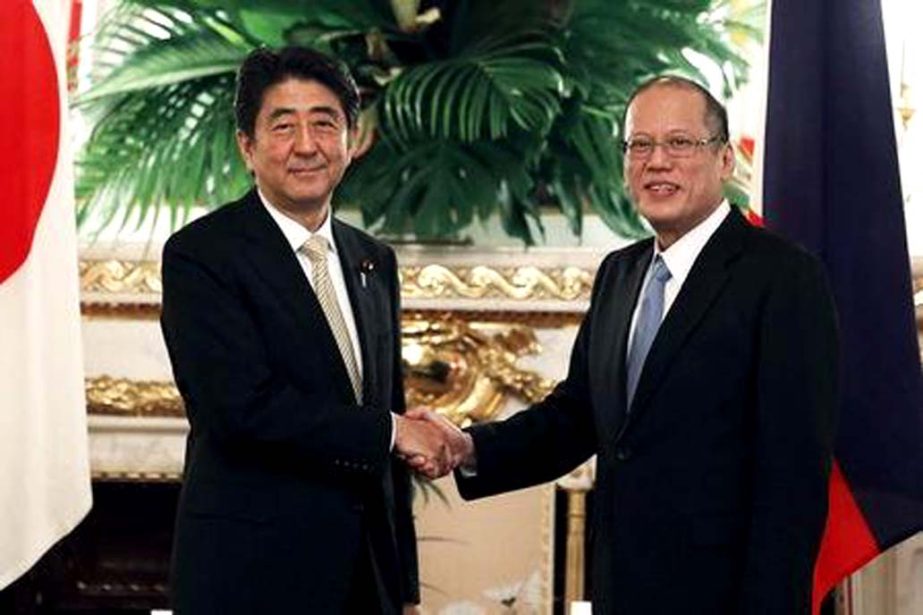
Reuters, Tokyo :Japanese Prime Minister Shinzo Abe on Thursday said he agreed with Philippine President Benigno Aquino to oppose unilateral attempts to change the status quo in the South China Sea.”Regarding the South China Sea issue, we’ve reaffirmed that we are concerned about the large-scale reclamation and that we are opposed to unilateral attempts to change the status quo,” Abe told a news conference after meeting with the visiting Philippine president.Their meeting came at a time when China has been taking an increasingly assertive posture in the South China Sea, building artificial islands in areas where the Philippines and other countries have rival claims.Japan, Philippines eye deeper defense ties as China rises Japan and the Philippines were set to demonstrate their deepening defense ties at summit talks Thursday as the two US allies work to form a united front against China’s increasing assertiveness.Aquino has passionately courted Japan, along with the United States, to help serve as a counterbalance to China’s claims to almost the entirety of the sea, a major global shipping route believed to be home to oil and gas reserves.Beijing has been aggressively constructing artificial islands, including with what appear to be military-supporting facilities, such as runways — aggravating regional tensions and drawing US demands to stop.Aquino on Wednesday sparked ire in Beijing by comparing it with Nazi Germany in the run-up to World War II.”If somebody said ‘stop’ to (Adolf) Hitler at that point in time, or to Germany at that time, would we have avoided World War II?” he said in a speech to business leaders.Tokyo and Manila are shoring up military and political ties, with a joint naval drill last month in the South China Sea. Washington has also sent ships and planes to survey the waters. Abe has long criticised China’s attempts to change the status quo by force, mindful of Japan’s own territorial dispute with Beijing over islands in the East China Sea that are the destination for Chinese paramilitary hardware. While ties between Tokyo and Beijing have warmed a little in recent months, including direct talks between Abe and Chinese President Xi Jinping, relations have been icy for years.Repeated demands for Tokyo to atone for its wartime aggression have irritated the Japanese public, which increasingly believes Beijing is using history as fuel for its nationalist fire and to bolster the ruling Communist Party’s domestic standing.In contrast, ties between Japan and the Philippines are warm, with Aquino having spoken of Japan’s obvious repentance and praised its decades of pacifism since defeat in World War II.Japan’s Emperor Akihito told Aquino on Wednesday his country feels “remorse” for its actions during the war.”During World War II… fierce battles between Japan and the United States took place on Philippine soil, resulting in the loss of many Filipino lives,” he said.”This is something we Japanese must long remember with a profound sense of remorse,” he said.Abe has long criticised China’s attempts to change the status quo by force, mindful of Japan’s own territorial dispute with Beijing over islands in the East China Sea that are the destination for Chinese paramilitary hardware.While ties between Tokyo and Beijing have warmed a little in recent months, including direct talks between Abe and Chinese President Xi Jinping, relations have been icy for years.Repeated demands for Tokyo to atone for its wartime aggression have irritated the Japanese public, which increasingly believes Beijing is using history as fuel for its nationalist fire and to bolster the ruling Communist Party’s domestic standing. In contrast, ties between Japan and the Philippines are warm, with Aquino having spoken of Japan’s obvious repentance and praised its decades of pacifism since defeat in World War II.Japan’s Emperor Akihito told Aquino on Wednesday his country feels “remorse” for its actions during the war.”During World War II… fierce battles between Japan and the United States took place on Philippine soil, resulting in the loss of many Filipino lives,” he said.

